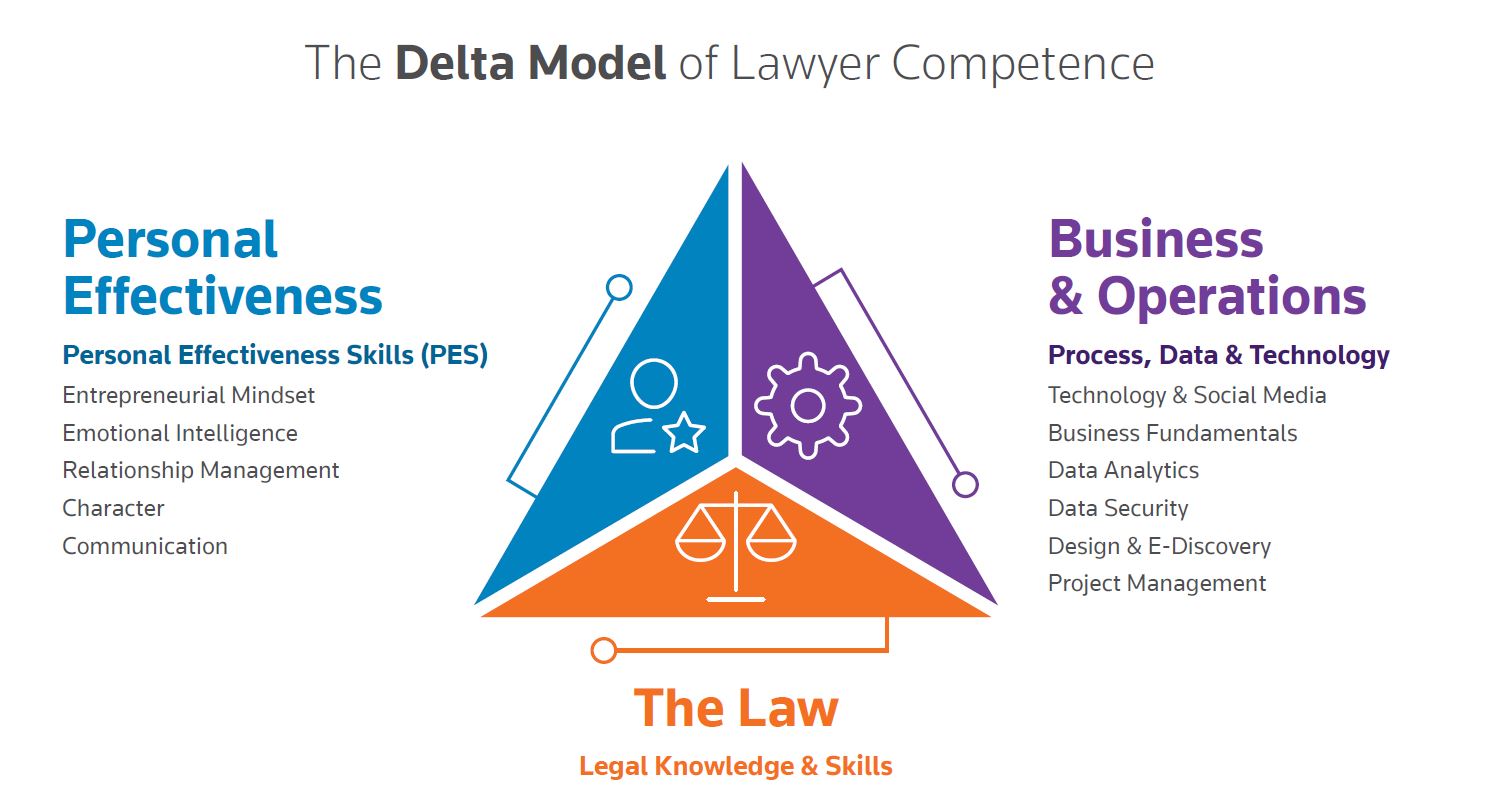In the latest issue of Forum magazine, we see how numerous legal industry pressures are dramatically reshaping many law firms' service delivery models
An increasing number of law firms are utilizing multidisciplinary teams to solve client problems. And while the traditional partner and associate roles are still critical in legal service delivery, a growing number of new and evolving roles within law firms are fundamentally altering how the delivery of legal services will operate in the future.
The Delta-Shaped law firm
Much has been written about how modern lawyers need to develop a multidisciplinary set of skills — beyond traditional legal skills — in order to practice law successfully in the 21st century. Thomson Reuters helped develop one of the latest models for the successful modern lawyer, the Delta model. Building on other examples that incorporate traditional legal skills and data and technology skills, the delta model also incorporates personal effectiveness skills such as communication skills and an entrepreneurial mindset.
These same concepts can be applied at the firm level. An increasing number of law firms are hiring multidisciplinary teams of nontraditional legal professionals like staff attorneys, project managers, pricing specialists, knowledge management professionals and data scientists to focus more on the emerging skill sets that differentiate how innovative law firms deliver services to their clients today.

Project managers
One of the fastest growing disciplines at law firms is project management. Already, 24% of law firms have adopted some form of legal project management, with another 27% planning to do so by the end of 2020, according to the Thomson Reuters “2019 Law Firm Business Leaders Survey.” While the pandemic may have changed some of these plans, it is certain that the need for skilled matter management will not diminish.
Indeed, hiring full-time project managers can improve cost-effective service delivery, and clients have also shown a willingness to pay law firms for project management services as a means of managing outside counsel costs. This suggests that paid-for project management services are a growing revenue opportunity for many law firms.
Project managers help plan and manage client engagements by bringing traditional project management techniques to legal matters. At its core, legal project management is about improving processes and facilitating better communication with the matter team internally and between lawyers and their clients. Legal project managers typically leverage technology to scope the work needed for a matter, develop budgets and project plans, and then manage to those plans.
At Shearman & Sterling, for example, the legal project management team is deployed with every case to support delivery teams, collect data and document processes to inform operational efficiency and data initiatives. Similarly, at Orrick, project managers are assigned to new matters and can leverage the firm’s matter management system to track all filings and data. The project managers also compile relevant litigation analytics on complaints, motions, judges, opposing counsel and more, loading that data into their matter management system and making it easier for attorneys to access information about the matter and develop effective case strategies.
Pricing
Law firms are also increasingly hiring pricing specialists to improve profitability and to deliver transparent and predictable pricing for clients. According to Altman Weil’s 2020 Law Firms in Transition Survey, 70.4% of firms with 250 or more attorneys employ a pricing director or staff member. The survey respondents saw value in these roles, with 63% saying that employing a pricing director or staff member had resulted in a significant improvement to firm performance. Only 2% said it has not led to significant improvement.
An increasing number of law firms are hiring multidisciplinary teams of nontraditional legal professionals to focus more on the emerging skill sets that differentiate how innovative law firms deliver services to their clients today.
Pricing professionals at law firms help budget matters, monitor matter profitability, and analyze financial data to identify emerging trends around clients, industries, and practice areas. Pricing professionals are especially important for developing alternative fee arrangements (AFAs). And as more clients demand AFAs as a way of ensuring predictable pricing, law firms are struggling to determine accurate pricing and the work required to complete a project. While the use of AFAs in the US has plateaued in recent years, firms that have leveraged pricing and project management professionals to properly scope, staff, price, and track matters have seen improved profitability.
Knowledge management & client value
Knowledge management roles have been around for a while, and have traditionally focused on leveraging technology and processes to organize the firm’s prior work product and expertise so it could be easily used to solve legal and business problems. For example, Skadden Arps has more than 30 practice-related knowledge sites that contain curated precedent, reference topics, deal information, “what’s current” offerings and a broad variety of other information. The sites are curated by knowledge lawyers whose sole job is to work with the different practice areas to facilitate access to needed information.
While this kind of work continues to be a critical part of knowledge managers’ jobs, an increasing number of forward-thinking knowledge teams are focused on automating processes and leveraging data analytics to help practices and the firm make data-driven decisions.
Further, some knowledge teams are working with clients to develop differentiated services and solutions for them. As the COVID-19 crisis took hold earlier this year, for example, Shearman & Sterling’s knowledge and client value team created and sent daily client alerts that tracked COVID-19 legislation and related key information. The team delivered these alerts to more than 30,000 clients daily before launching a COVID-19 Legislation Tool for their clients. Similarly, Fisher Phillips’ knowledge management team launched a COVID-19 Employment Litigation Tracker for their clients.
An increasing number of knowledge teams also have developed and maintained client-facing portals and dashboards that give clients easy access to key information. In doing so, these knowledge teams aren’t just improving lawyer productivity, they are improving the client relationship by delivering these unique offerings.
Data science & analytics
Another growing discipline — and another increasingly important nonlawyer role — at law firms is data science and analytics. Law firms are increasingly relying on data analytics to improve both the business and practice of law. They’re leveraging third-party litigation analytics tools and hiring data scientists to analyze firm data. As early as 2018, many large law firms have viewed the hiring of data analytics professionals on the same level and pace as hiring for information security staff, according to International Legal Technology Association’s 2018 Annual Technology Survey, which showed that firms were hiring 4.41 data analytics full-time equivalent (FTE) employees as compared to 4.32 information security FTE employees.
Data science and analytics professionals are responsible for mining, structuring, and interpreting firm data sets in order to drive better business results with data-driven decisions, price projects and unique client insights. They also help develop new products and services. “The applications of data, once you have it prepared to be analyzed, are infinite,” says Kate Orr, Innovation Partner at Orrick. “You just have to think of them!”






